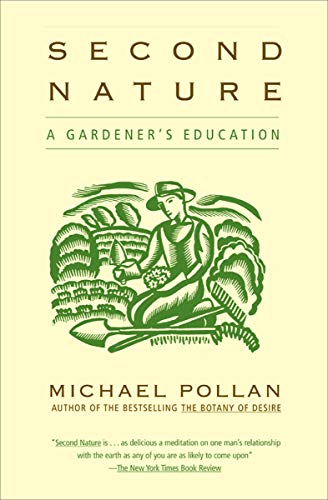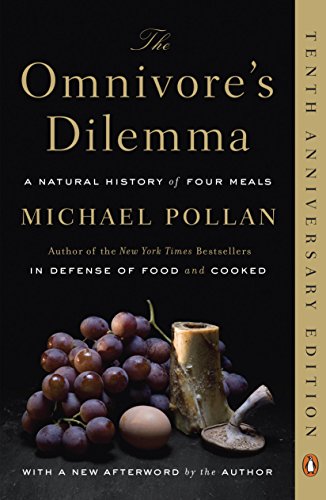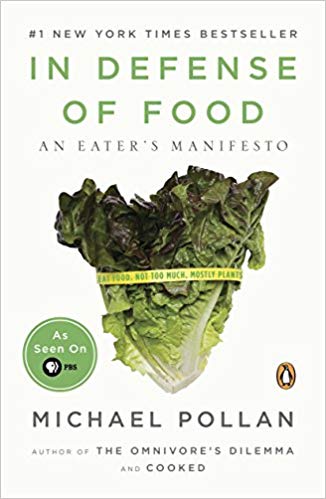I first got acquainted with Michael Pollan back when I was trying to be a vegetable gardener as well as a flower gardener and was reading every gardening book I could get my hands on.

Second Nature: A Gardener’s Education was written in 1991; I probably read it 3-4 years later after we bought our first house and I was trying to get do something worthwhile in the yard. Pollan’s book uses his experiences in starting a vegetable garden of his own as a jumping-off point for all sorts of thoughts about how we provide food for ourselves and how a garden shapes the gardener as well as the other way around. I’d recommend it highly if you’re interested in growing anything in the dirt. I have officially taken myself out of the vegetable gardening business, but even so I’d probably enjoy re-reading this book. (How it can be possible that someone can grow flowers successfully but not vegetables is a puzzle, but I seem to fit into that category, so I’ve thrown in the towel. The farmer’s markets around here should be getting some business from me starting soon.)
But Pollan moved from growing food to cooking it in his next several books, and these are the ones I encourage the readers of this blog to explore. Our relationship with food in this modern industrial society has become such a mess for so many people that it’s a great thing to sit down with a book that celebrates food in the same way that I try to do: as fuel that needs to be appropriately consumed but is a great source of pleasure and as a means of community and fellowship. Pollan has now moved on to other topics; his most recent book (which I don’t plan to read) is all about “the new science of psychedelics.” Ah well.
Let me emphasize that the three books I summarize below are not cookbooks. There’s a plague upon the land of fancy cookbooks and shows that people consume more and more as less and less actual home cooking is going on. A fancy kitchen may be de rigeur as a remodeling project, but there ain’t much in the way of meal prep going on in them. (I like what my brother-in-law-in-law, that is, my sister-in-law’s husband, says about kitchens: that he couldn’t possibly care less what the countertops are made of as long as he has a good stove and can do actual cooking in it. Wise man!) So you could certainly do some cooking from these books, but their real purpose is get inform and excite you about the place of food in our lives. Here they are.
 The Omnivore’s Dilemma: A Natural History of Four Meals
The Omnivore’s Dilemma: A Natural History of Four Meals
I love this book. In it, Pollan follows food pathways to consume four different meals:
1. “Industrial” food, either from the grocery store or the fast-food chain, that is based largely on modern corn. I think he ends up making his own McNuggets and Cheetos, but it’s been a long time since I read this.
2-3. “Organic” food, with two different sources: a Whole Foods supermarket and an organic farm. Pollan makes two very different meals here. After all, a WF will carry Argentinian strawberries, but the local farm he patronizes (Polyface Farms in Virginia, headed up by farmer Joel Salatin) has only what’s in season.
4. “Foraged” food, akin to our so-called “hunter-gatherer” ancestors. Pollan even harvests his own salt! The main course ends up being wild boar, which Pollan shoots with the help of a hunter friend.
![Cooked: A Natural History of Transformation by [Pollan, Michael]](https://respectfoodroles.com/wp-content/uploads/2019/03/41CvtF6ScXL.jpg) Cooked: A Natural History of Transformation
Cooked: A Natural History of Transformation
Do ya see a certain theme developing here? Not only is this another “natural history,” but it’s also divided up into four parts, developing ideas on the four ways we transform food—fire, water, air and earth—the four elements. We roast, bake, grill, or broil, using heat from a literal or metaphorical fire; we boil, simmer, braise or stew, using liquid as the cooking medium; we let things ferment, using elements from the air (yeast in bread, for example) or from the earth (the bacteria that produce sauerkraut, for example). I remember thinking as I read those last two sections that they overlapped a bit, but no matter. Oh, and this book was made into an utterly fascinating four-part documentary that we watched several years ago on Netflix. (Video of the trailer is below; if you can watch those couple of minutes without your mouth watering, well, I just don’t know about you!)

In Defense of Food: An Eater’s Manifesto
I just re-read this one, and honestly, folks, he sounds just like me. Or I sound just like him. Whatever. We’re both saying, “Just eat the food, for Heaven’s sake, enjoy it, put it in its proper place in life, and quit agonizing over it!” It’s not a terribly long book, and for most of it you’ll probably be saying to yourself, “But all this I did know before!” (Double points here if you know what Shakespeare play that exclamation comes from.) It’s just all purest common sense, written by someone who has devoted a big chunk of his adult life to writing and speaking about the joys of food and how they’re being stolen from us by the attitudes we’ve developed in response to our crazy modern food culture. One big takeaway from this great book: We don’t eat “nutrients,” we eat food. If your appetite is whetted by the text of the book itself, you can then follow up to your heart’s content by consulting the voluminous notes section at the end.
So I’d encourage you to pick one of the above and plunge in. When you come up for air, you may just have a fresh perspective on that stuff on your plate—and a better one.
Links to books are Amazon Associate links; if you click on the link and purchase the book, or indeed any other item during that session, I will receive a small commission at no additional cost to you.